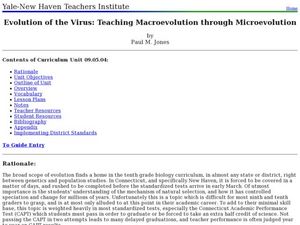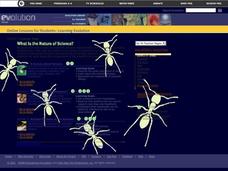Curated OER
Why is Evolution Controversial?
High schoolers examine the controversy surrounding evolution --- the challenges to science, the battles over teaching evolution in the schools, and the reconciliation of religion and science. They also examine an interactive time line...
Curated OER
Replacing Missing Links in the Evolutionary Chain
Examine the evolution of various species of hominids from their earliest existence approximately 4.5 million years ago to today. In small groups, learners research one of the ten stages of hominid evolution and then create a poster and...
Curated OER
Why Is Evolution Controversial?
Students examine the legal side of the teaching of evolution. They study the Scopes Trial and reflect on what it means for a teacher to be denied the right to teach a key scientific concept. In addition, they design their own editorial...
Curated OER
Ecology and Evolution
Students identify the different taxonomic classifications of organisms. In this biology lesson, students create their own organisms and make some changes according to environmental conditions. They present their work in class.
Curated OER
You Have All the Answers
Students explore the concept of theories in science while examining the theory of evolution. They conduct research and participate in a discussion about current issues in science culminating in the creation of question and answer pamphlets.
Curated OER
Creative Ways To Teach Evolutionary Concepts
Research how DNA, the genetic blueprint of living organisms, plays an essential role in the continuity of life. High schoolers will summarize how their influence may very well effect the destiny of the population from one generation to...
ARKive
Adaptations for Movement
What animals are best suited for moving around a rainforest, or a desert? Design your own animal species based on a particular habitat, focusing on the characteristics it will need for optimal movement. Great as a group lesson or...
Curated OER
Becoming Whales: Experiencing Discoveries of
Students experience, through a "dig," the historical discovery of fossils which increasingly link whales to earlier land-dwelling mammals. They encounter the intermediate forms which show changes that lead to the modern whale.
Curated OER
The Growth of America's Production System
Middle schoolers, assessing a variety of sources, explore the growth of inventions that were brought about by the Industrial Revolution. They analyze labor practices and philosophies within the history of the United States. A timeline is...
ARKive
Galapagos Conservation
The Galapagos Islands inspired Darwin to develop his theory of evolution. These wonderful islands will also be the topic of a lesson on habitat and conservation. In small groups, learners will collect and synthesize information regarding...
Curated OER
Evolution of the Virus: Teaching Macroevolution Through Microevolution
Students describe the anatomy of a virus. In this biology lesson plan, students compare and contrast the characteristics of bacteria and viruses. They discover the genetic adaptations of viruses over time.
Curated OER
Genetic Jewels: Building the DNA Model
Students construct segments of DNA to create a piece of jewelry. In this genetics lesson students create a DNA sequence that they turn into something to wear.
Curated OER
Global Faith
Students review their prior knowledge of religious symbols and their meanings. After reading an article, they discover the comeback of the Muslim faith in Spain. In groups, they research and compare the evolutions of two religions in a...
Curated OER
Lifestyles of the Extreme and Adapted
Learners explain challenging theories about the evolution and distribution of microbes. They also investigate other examples of extremophile species, then create posters and write diary entries about them.
Curated OER
Aqueduct Architecture: Moving Water to the Masses in Ancient Rome
Ninth graders compare ancient and modern technology in water transporting. In this lesson on the evolution of the aqueduct, 9th graders build a working aqueduct model and examine its components. They explain the importance and use of the...
Curated OER
A Changing Society: Industrialization and Urbanization
Students participate in activities that teach them about the Gilded Age of industrialization and urbanization. In this social changing lesson plan, students answer questions, watch videos, have discussions, read texts, and more to teach...
Curated OER
Depicting Women and Class in a Global Society
Students analyze the evolution of women's work from the 19th century to present day and create artwork depicting women. In this women's roles lesson, students compare and contrast the use of space and color in the two paintings depicting...
Curated OER
Passion for Change
Students reflect upon traditional, cultural, or ritualized events. They research and document the evolution of a familiar tradition or ritualized event and creatively represent the changes to the tradition.
Curated OER
What is the Nature of Science?
Students examine videos of field researach to discover the components of the scientific process. Using forms, they conduct community surveys about the nature of science. They research the extinction of dinosaurs and compare...
Curated OER
Give Me Liberty or Give Me Freedom
Welcome to America, the land of liberty and freedom. Examine the ways in which the terms liberty and freedom have been used in the United States. After researching and analyzing quotations from the past and present, learners create an...
Curated OER
Spring
Students examine lichens in an outside field trip. Students explore the diversity of this organism and ask questions about them.
Curated OER
Playing with Language: Tall Tales and Codes
Young scholars interpret and identify the elements of folktales, with an emphasis on tall tales, in this lesson. Students utilize brainstorming techniques to list ways people communicate. Young scholars also read and create a time line...
Curated OER
West Nile Virus and Lyme Disease: Making Sense of the Numbers
In an interdisciplinary exploration, trace the development of West Nile fever and Lyme diseases. Pupils discover how these diseases are contracted. They collect statistical data and analyze trends.
Curated OER
Inquiry and the Nature of Science
Students identify questions that can be answered through scientific investigations, design and conduct a scientific investigation. They also use appropriate tools and techniques to gather, analyze, and interpret data.























